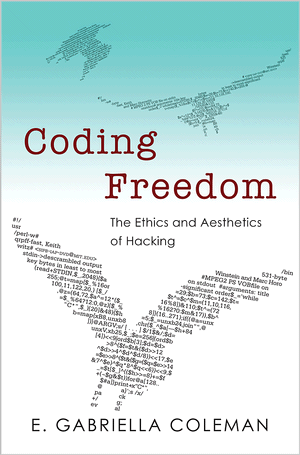E. Gabriella Coleman: Coding Freedom: The Ethics and Aesthetics of Hacking (2012–) [EN, SC]
Filed under book | Tags: · aesthetics, anonymous, anthropology, code, computing, ethics, floss, free software, hacker culture, hacking, intellectual property, internet, internet activism, software, web

“Who are computer hackers? What is free software? And what does the emergence of a community dedicated to the production of free and open source software–and to hacking as a technical, aesthetic, and moral project–reveal about the values of contemporary liberalism? Exploring the rise and political significance of the free and open source software (F/OSS) movement in the United States and Europe, Coding Freedom details the ethics behind hackers’ devotion to F/OSS, the social codes that guide its production, and the political struggles through which hackers question the scope and direction of copyright and patent law. In telling the story of the F/OSS movement, the book unfolds a broader narrative involving computing, the politics of access, and intellectual property.
E. Gabriella Coleman tracks the ways in which hackers collaborate and examines passionate manifestos, hacker humor, free software project governance, and festive hacker conferences. Looking at the ways that hackers sustain their productive freedom, Coleman shows that these activists, driven by a commitment to their work, reformulate key ideals including free speech, transparency, and meritocracy, and refuse restrictive intellectual protections. Coleman demonstrates how hacking, so often marginalized or misunderstood, sheds light on the continuing relevance of liberalism in online collaboration.”
Publisher Princeton University Press, 2012
Creative Commons Attribution-NonCommercial-NoDerivs 3.0 License
ISBN 1400845297, 9781400845293
264 pages
Responses: Jo Bates, Denisa Kera, Brett Lunceford, Jorge Luis Zapico, Alexander Halavais, Stéphane Leman-Langlois, Ethan Zuckerman
Reviews: James Grimmelmann (Jotwell: Cyberlaw, 2012), David Banks (Cyborgology, 2012), Eric Raymond (2013), Cade Metz (Wired, 2013), Mike Doherty (Hashbang, 2013), Bruce Byfield (Linux Mag blog, 2013), Bryan Behrenshausen (OpenSource.com, 2013), Roy S. Gutterman (Journalism & Mass Communication Q, 2014), Tim Jordan (American J Sociology, 2014), Emily T. A. Earl (Techno_ethno, 2014), Anne Elizabeth Yaniga (Techno_ethno, 2014), Sebastian Kubitschko (Culture Machine, 2014).
Coding Freedom (English, updated on 2013-1-18, PDF, EPUB [updated on 2014-9-2])
Kodiranje slobode. Etika i estetika hakovanja (Serbo-Croatian, trans. Ljubica Gotić and Predrag Todić, 2014)
Jeffrey R. Di Leo, Uppinder Mehan (eds.): Terror, Theory and the Humanities (2012)
Filed under book | Tags: · aesthetics, education, film, philosophy, terrorism, theory, war on terror

The events of September 11, 2001, have had a strong impact on theory and the humanities. They call for a new philosophy, as the old philosophy is inadequate to account for them. They also call for reflection on theory, philosophy, and the humanities in general. While the recent location and killing of Osama bin Laden, the leader of al-Qaeda, in Pakistan on May 2, 2011—almost ten years after he and his confederates carried out the 9/11 attacks—may have ended the “war on terror,” it has not ended the journey to understand what it means to be a theorist in the age of phobos nor the effort to create a new philosophy that measures up with life in the new millennium. It is in the spirit of hope—the hope that theory will help us to understand the age of terror—that the essays in this collection are presented.
With essays by Christian Moraru, Terry Caesar, David B. Downing, Horace L. Fairlamb, Emory Elliott, Elaine Martin, Robin Truth Goodman, Sophia A. McClennen, William V. Spanos, Zahi Zalloua.
Publisher Open Humanities Press, an imprint of MPublishing, University of Michigan Library, Ann Arbor
Critical Climate Change series
Creative Commons Attribution Share Alike 3.0 License
ISBN 1607852497, 9781607852490
248 pages
PDF
View online (HTML)
Sianne Ngai: Ugly Feelings (2005)
Filed under book | Tags: · aesthetics, affect, art, avant-garde, emotion, feminism, literature, modernity, politics, postmodern

“Envy, irritation, paranoia—in contrast to powerful and dynamic negative emotions like anger, these non-cathartic states of feeling are associated with situations in which action is blocked or suspended. In her examination of the cultural forms to which these affects give rise, Sianne Ngai suggests that these minor and more politically ambiguous feelings become all the more suited for diagnosing the character of late modernity.
Along with her inquiry into the aesthetics of unprestigious negative affects such as irritation, envy, and disgust, Ngai examines a racialized affect called “animatedness,” and a paradoxical synthesis of shock and boredom called “stuplimity.” She explores the politically equivocal work of these affective concepts in the cultural contexts where they seem most at stake, from academic feminist debates to the Harlem Renaissance, from late-twentieth-century American poetry to Hollywood film and network television. Through readings of Herman Melville, Nella Larsen, Sigmund Freud, Alfred Hitchcock, Gertrude Stein, Ralph Ellison, John Yau, and Bruce Andrews, among others, Ngai shows how art turns to ugly feelings as a site for interrogating its own suspended agency in the affirmative culture of a market society, where art is tolerated as essentially unthreatening.
Ngai mobilizes the aesthetics of ugly feelings to investigate not only ideological and representational dilemmas in literature—with a particular focus on those inflected by gender and race—but also blind spots in contemporary literary and cultural criticism. Her work maps a major intersection of literary studies, media and cultural studies, feminist studies, and aesthetic theory.”
Publisher Harvard University Press, 2005
ISBN 0674015363, 9780674015364
viii+422 pages
Reviews: Jennifer L. Fleissner (Modernism/modernity, 2006), Jennifer Greiman (Leviathan, 2012), Eu Jin Chua (Bryn Mawr Review of Comparative Literature, 2007), Dina Mendonça (Metapsychology, 2005).
Interview with author (Adam Jasper, Cabinet)
Publisher
PDF, PDF (updated on 2018-5-23)
Comment (0)
